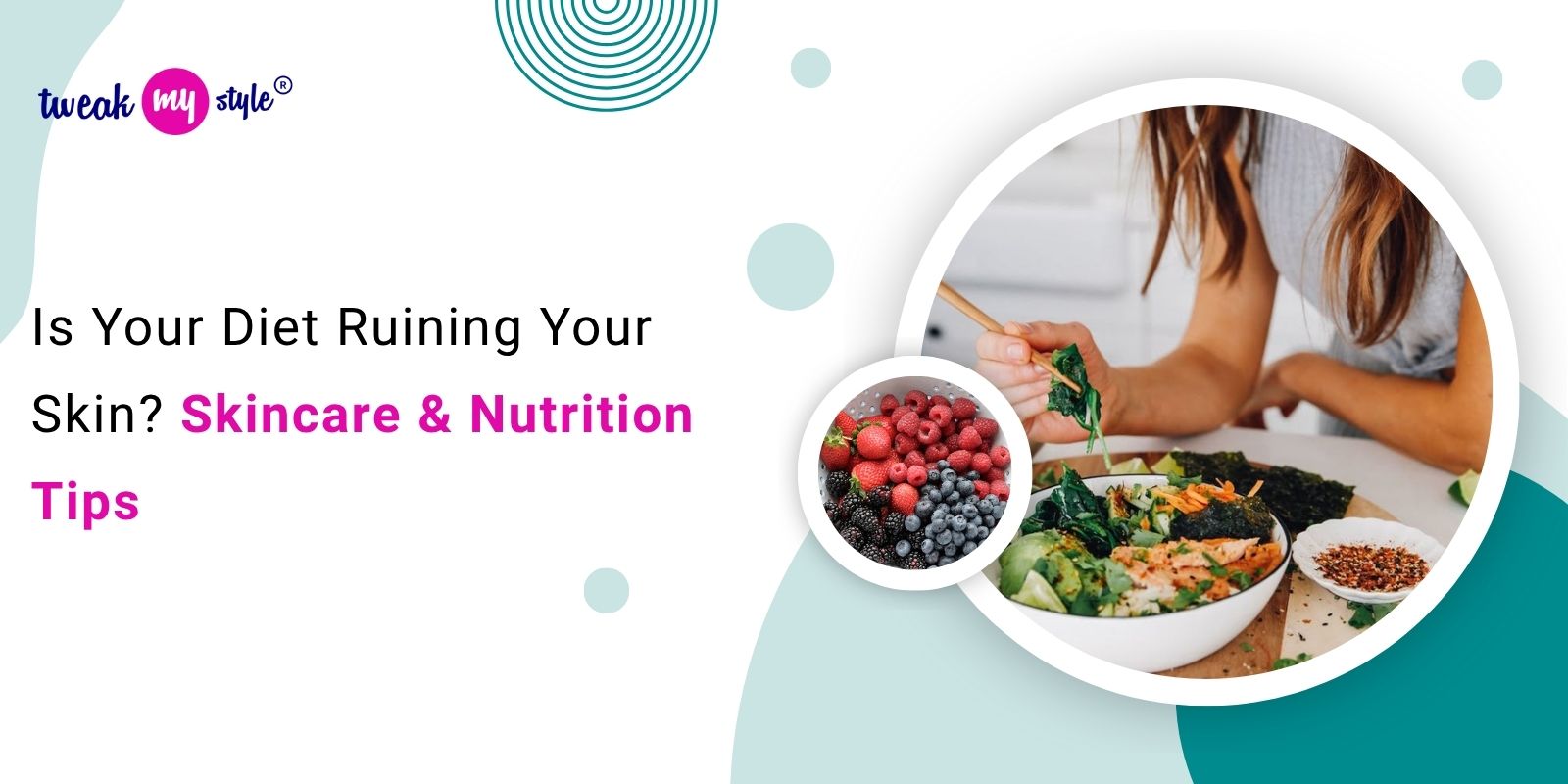- Aug 04, 2025
- Skincare Tips
- 666
Share this post on:

We spend countless dollars and hours perfecting our skincare routines – searching for the “holy grail” serum, meticulously layering masks, and diligently exfoliating. But what if the secret to radiant, healthy skin isn’t just about what you put on your face, but what you’re putting in your body? The truth is, nutrition plays a surprisingly significant role in skin health. Just like a car needs the right fuel to run smoothly, your skin needs the right nutrients to thrive. This blog post dives deep into how your diet impacts your skin, explores the connections between common skin concerns and nutritional deficiencies, and provides actionable tips to nourish your skin from within.
The Skin-Nutrition Connection: A Deeper Look
Your skin is the largest organ in your body and a vital barrier against the outside world. It’s constantly regenerating, meaning it requires a steady supply of nutrients to build new cells and maintain its integrity. Here’s how diet impacts your skin's health:
- Building Blocks for Skin Cells: Collagen, elastin, and keratin – key structural components of skin – are all protein-based. Adequate protein intake is crucial for their production. Fats, particularly essential fatty acids, contribute to skin barrier function, keeping moisture in and irritants out. Vitamins and minerals act as cofactors in countless enzymatic reactions essential for cell growth, repair, and protection.
- Inflammation & Skin Conditions: A diet high in processed foods, sugar, and unhealthy fats can trigger chronic inflammation throughout the body, including the skin. Inflammation is a significant contributor to many common skin conditions.
- Gut Health & Skin Health: The gut microbiome, the complex community of microorganisms living in your digestive system, has a profound influence on overall health, including skin health. An unbalanced gut microbiome (dysbiosis) can lead to inflammation, leaky gut syndrome, and nutrient deficiencies – all of which can negatively impact your skin.
- Antioxidant Protection: Skin is constantly exposed to damaging free radicals from sun exposure, pollution, and stress. Antioxidants neutralize these free radicals, protecting skin cells from damage. Diet is a primary source of these vital antioxidants.
Common Skin Concerns & Their Nutritional Links
Let's look at specific skin conditions and the potential nutritional deficiencies or dietary imbalances that may be contributing factors. Please note: This is for informational purposes only and not a substitute for professional medical advice.
- Acne: While hormonal factors and genetics play a role, diet can exacerbate acne.
- High Glycemic Load: Foods that rapidly spike blood sugar (refined carbs, sugary drinks) can increase insulin levels, leading to increased sebum production and inflammation – a recipe for breakouts.
- Dairy: Dairy products contain hormones and IGF-1, which can stimulate oil production. Individual sensitivities vary.
- Omega-6 Imbalance: A diet overly rich in omega-6 fatty acids (found in vegetable oils) without sufficient omega-3s can contribute to inflammation.
- Deficiency in Zinc: Zinc is essential for wound healing and immune function; deficiency can worsen acne.
- Eczema (Atopic Dermatitis): This condition is often linked to gut inflammation and immune dysfunction.
- Food Allergies/Sensitivities: Identifying and eliminating trigger foods (gluten, dairy, soy, nuts) can significantly improve eczema symptoms.
- Omega-3 Deficiency: Omega-3s have anti-inflammatory properties that can help soothe irritated skin.
- Probiotic Deficiency: A healthy gut microbiome is essential for immune regulation.
- Rosacea: This chronic inflammatory skin condition causing redness and bumps, can be exacerbated by dietary triggers.
- Histamine-Rich Foods: Fermented foods (cheese, sauerkraut), alcohol, and processed meats can trigger flare-ups in sensitive individuals.
- Caffeine & Spicy Foods: These can cause vasodilation (widening of blood vessels), contributing to redness.
- Sulfites: Found in wine and some processed foods, can be a trigger for some.
- Dryness & Premature Aging: Lack of essential nutrients can compromise the skin barrier, leading to dryness, flakiness, and premature aging.
- Essential Fatty Acid Deficiency: Omega-3 and omega-6 fatty acids are vital for maintaining skin barrier function and hydration.
- Vitamin A Deficiency: Important for cell turnover and collagen production.
- Antioxidant Deficiency (Vitamin C, Vitamin E): Without adequate antioxidant protection, skin is more vulnerable to damage.
Skincare & Nutrition: A Combined Approach – Your Actionable Plan
Now that we've established the link, let's outline a plan to nourish your skin from the inside out.
- Hydration is Key: Drink plenty of water throughout the day. Aim for at least 2 liters. Water helps transport nutrients to skin cells and flush out toxins.
- Embrace a Whole-Foods Diet: Focus on unprocessed foods rich in nutrients.
- Fruits & Vegetables: Packed with vitamins, minerals, antioxidants, and fiber. Dark leafy greens (spinach, kale) are particularly beneficial.
- Healthy Fats: Include sources of omega-3 fatty acids (fatty fish like salmon, flaxseeds, chia seeds, walnuts), avocado, and olive oil.
- Lean Protein: Essential for collagen and elastin production. Choose fish, poultry, beans, lentils, and tofu.
- Whole Grains: Provide sustained energy and fiber for gut health.
- Prioritize Gut Health:
- Probiotic-Rich Foods: Yogurt (with live cultures), kefir, sauerkraut, kimchi.
- Prebiotic Foods: Onions, garlic, leeks, asparagus, bananas – these feed the beneficial bacteria in your gut.
- Limit Processed Foods: These can disrupt the gut microbiome.
- Targeted Supplements (Consideration & Consultation Needed):
- Omega-3 Fatty Acids: If you don't consume enough fatty fish.
- Collagen: May support skin elasticity and hydration (consult a doctor).
- Vitamin D: Many people are deficient, and it plays a role in skin health.
- Zinc: Especially helpful for acne-prone skin.
- Vitamin C: A powerful antioxidant and supports collagen synthesis.
- Always consult with a healthcare professional before starting any new supplements.
- Food Journaling: Keep a record of your meals and any skin changes. This can help you identify potential trigger foods.
- Be Patient: It takes time for dietary changes to impact skin health. Be consistent and give your body time to adjust.















